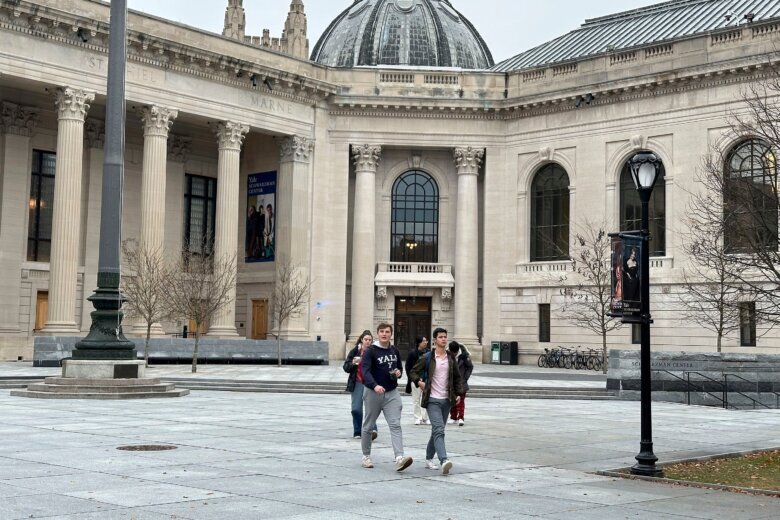
(CNN) — After almost four years, Yale University is joining another Ivy League school to once again require applicants to submit an SAT or ACT score, saying the change could help boost admittance for underprivileged students despite concerns from advocates.
The school said Thursday it would also allow applicants to provide scores from advanced placement or international baccalaureate instead of the tests. The change followed Dartmouth College, the first Ivy League school to bring back the requirement on February 5, although it is not offering AP or IB scores as an alternative.
Other schools – including the rest of the Ivy League, along with the California State University System and the University of Michigan – have stuck with the decision to do away with the testing requirement. Yale was one of hundreds of schools to go test-optional during the Covid-19 pandemic, meaning students could choose whether to submit their scores on standardized tests like the SAT and ACT on applications.
The decision comes after the Supreme Court gutted affirmative action in 2023, ruling colleges and universities could no longer take race into consideration as a specific basis for granting admission.
After years of debate, Yale explained through its data the change would help boost admittance students from low-income backgrounds and underrepresented minorities. But critics argue the tests could worsen inequalities and hurt the chances for many minorities, who tend to score lower, to gain access to better schools.
Boosting low-income students, Yale says
Requiring test scores doesn’t further economic inequality in the admissions process, dean of undergraduate admissions, Jeremiah Quinlan, said in a news release announcing the change. In fact, he argued, it can do the opposite.
Strong test scores can help boost students from low socioeconomic backgrounds who might not have other opportunities to demonstrate their capabilities on an application, a news release from the Yale admissions team said.
Quinlan argued while the last few years’ pool of applicants had the most economic and racial diversity in Yale’s history, the lack of test scores at times worked toward the disadvantage of these students.
“For students attending high schools with fewer resources, applications without scores can inadvertently leave admissions officers with scant evidence of their readiness for Yale,” Quinlan said. “When students attending these high schools include a score with their application — even a score below Yale’s median range — they give the committee greater confidence that they are likely to achieve academic success in college.”
In the news release, Yale said a student’s scores on standardized tests were the single greatest predictor of the student’s future grades.
Quinlan also said Yale had been able to increase its diversity even before the shift to making tests optional – citing a 65% increase in first-generation students admitted and a 52% increase in underrepresented minorities between 2013 and 2019.
Testing worsens inequities, critics say
However, some advocates criticized Yale’s new test-flexible policy, arguing it disadvantages students of lower socioeconomic backgrounds and underrepresented minorities.
“If you go back far enough, the SAT and its cousin the ACT were developed essentially within the eugenics movement, out of intelligence test and IQ tests,” said Harry Feder, executive director at FairTest, which advocates for equitable and fair student testing. “It was designed to be an exclusionary tool against those who were not part of the dominant majority culture.”
The SAT has also long been criticized for bias against marginalized communities.
White and Asian students overwhelmingly make up the SAT’s top scorers, as do students of wealthier socioeconomic backgrounds. Students whose parents are in the wealthiest top 1% are 13 times more likely than low-income students to score above a 1300 on the SAT, research from Opportunity Insights showed.
A study by the Brookings Institution noted “many colleges use SAT scores for admissions and financial aid decisions.” The group said “more selective institutions require high SAT scores for entry—and there are even bigger race gaps at the top of the score distribution.”
Jeff Selingo – author of ‘Who Gets in and Why,’ which examined who gets into the most elite universities – previously told CNN going test-optional means admissions officers “would be looking at applications they would not have seen previously when they required test scores.”
These applicants, Feder said, only get into the pool in the first place if schools don’t require test scores.
“By requiring a score, you’re saying to tens of thousands of talented kids – particularly of disadvantaged socioeconomic status and racialized minorities– you didn’t get a high enough score? You’re not applying.”
“It’s going to stop those applications from coming in,” he added. “School after school, study after study, shows test-optional policies gets them a more diverse applicant pool, and an equally talented pool.”
The-CNN-Wire
™ & © 2024 Cable News Network, Inc., a Warner Bros. Discovery Company. All rights reserved.








